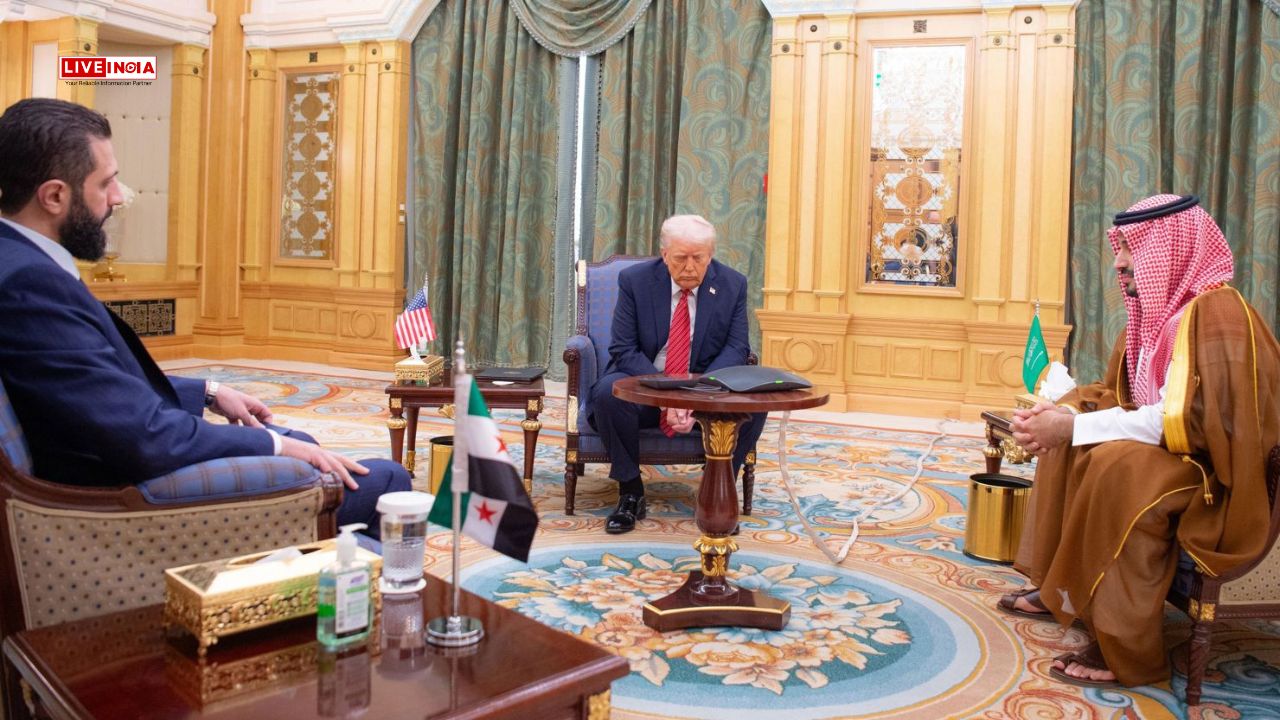– Advertisement –
From global terrorist to head of state — Trump’s recognition of Syria’s interim President Ahmad al-Sharaa redraws alliances, ends decades-long sanctions, and unsettles traditional power dynamics.
May 15, 2025: In a development that has stunned the international community, former US President Donald Trump met Syria’s interim President Ahmad al-Sharaa in Saudi Arabia on Tuesday, signaling a major shift in Middle East diplomacy and global geopolitics. The meeting, reportedly arranged by Saudi Crown Prince Mohammed bin Salman, marked a dramatic endorsement of Syria’s new leadership and ended over four decades of US sanctions against the country.
From Terrorist to President: The Rise of Ahmad al-Sharaa
Al-Sharaa, once known as Abu Mohammad al-Jawlani, was formerly a senior Al Qaeda and ISIS leader and was on the United Nations’ and US’s list of designated global terrorists. He founded the Al-Nusrah Front (later rebranded as Hay’at Tahrir al-Sham or HTS) — a key group in the Syrian civil war with the objective of toppling the Assad regime.
Also Read: Heart-Wrenching Plea Highlights Balochistan’s Crisis of Enforced Disappearances
– Advertisement –
In late 2024, HTS-led forces launched a swift offensive that forced Bashar al-Assad to flee to Russia, ending the Ba’athist regime’s 53-year rule. By January 2025, al-Jawlani re-emerged under his new name, Ahmad al-Sharaa, and assumed Syria’s interim presidency.
Trump Lifts Sanctions, Offers Recognition
Following the historic meeting, Trump announced the full removal of US sanctions on Syria, in place since 1979, describing the move as a “chance at peace under al-Sharaa.” The decision effectively legitimizes the new Syrian regime — a startling reversal of US policy that previously branded Syria a sponsor of terrorism.
Also Read: Guneet Monga Kapoor Launches Women in Film India at Cannes, Empowers Rising Producers
During a closed-door meeting, Trump encouraged al-Sharaa to lead Syria “for the people” and urged him to join the Abraham Accords, establishing diplomatic relations with Israel, and to expel all foreign terrorists from Syrian soil.
Saudi Arabia and Turkey Join the Equation
Saudi Arabia played a key diplomatic role in facilitating the meeting, with Crown Prince Mohammed bin Salman praised by Trump for helping create “the opportunity for lasting peace.” Turkish President Recep Tayyip Erdoğan also joined the discussions via phone call, suggesting broader regional endorsement of the new Syrian leadership.
Gulf nations, long wary of Iran’s growing influence through the Assad regime, are reportedly viewing Syria’s new government as a counterweight to Tehran, ushering in a possible new bloc in West Asian politics.
Israel’s Unease
Israel, however, has expressed strong reservations over the US recognizing al-Sharaa’s regime, citing his terror affiliations. Tel Aviv has warned Washington that aligning with a former jihadist could pose long-term security threats and moral complications, despite his rebranding and promises of peace.
A Turning Point for Syria
In a statement, Syria’s foreign ministry described Trump’s move as a “pivotal turning point” and welcomed the lifting of sanctions as a path toward national reconstruction and stability. “The removal of these sanctions offers a vital opportunity for Syria to pursue stability, self-sufficiency, and meaningful national reconstruction, led by and for the Syrian people,” the statement read.
As the dust settles on this landmark encounter, experts say the meeting could reshape power alignments across the Middle East, potentially altering the region’s longstanding alliances and rivalries — all under the shadow of one of the most dramatic political comebacks in recent history.
🏷️ Tags:
Donald Trump, Ahmad al-Sharaa, Syria sanctions lifted, Middle East politics, US foreign policy, Hay’at Tahrir al-Sham, Bashar al-Assad collapse, Saudi Arabia diplomacy, Abraham Accords, Israel Syria tensions, Syria reconstruction, Gulf alliances, geopolitics, West Asia
